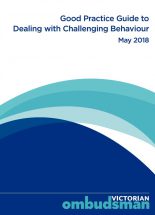Local governments should adopt a four-staged “graduated response” to dealing with abusive behaviour from members of the public, Victoria’s Ombudsman has recommended.
Deborah Glass says her office is constantly asked for advice from government departments, agencies and local councils on what to do with overly persistent or abusive people.
The Victorian Ombudsman says she recognises this is a “difficult balancing act” for government bodies.

“The public sector exists to serve the public including those who may be demanding. But public sector resources are limited, and agencies need to protect the health and safety of their workforce,” she says.
On Wednesday Ms Glass released a new resource, Good Practice Guide to Dealing with Challenging Behaviour, to help create better understanding between government bodies and the public.
“I hope the guide helps to defuse, de-escalate and demystify the behaviours that public servants encounter daily, and that greater understanding leads to fewer complaints,” Ms Glass said.
The guide recommends a graduated four-stage response:
- preventing challenging behaviour where possible through good complaint handling
- de-escalating challenging behaviour in the first instance
- managing behaviour where it raises health, safety, resource or equity issues
- limiting access as a last resort, in a “lawful, fair and transparent” way.
The resource contains practical tips and examples to help complaint handlers at each stage, and a model policy to guide leaders and managers.
There is specific advice about dealing with challenging behaviour that may be associated with a disability or mental illness, and responding to people who raise concerns about suicide.
“The guide stresses that people who handle complaints in the public sector are human too. It provides practical advice for complaint handlers about looking after themselves, and for managers about taking care of their staff,” according to the resource.
Tapping into agencies’ experience
The guide builds on the Managing Unreasonable Conduct by Complainants Practice Manual that was first developed by parliamentary ombudsmen in Australia and New Zealand in 2007 and also takes account of international literature on deescalating conflict.

The information in the guide was reviewed by a psychologist with experience in government complaint handling and investigations.
Victoria’s Ombudsman said the experience of her own office has also contributed to the guide.
“We know that challenging behaviour is difficult because we deal with it too. People contact the Ombudsman because they are frustrated with something an agency has or has not done. Sometimes that frustration spills over into the way they communicate with us.”
The guide also drew on the expertise of bodies including the Disability Services Commissioner, the Mental Health Complaints Commissioner, the Victorian Equal Opportunity and Human Rights Commission and the Office of the Public Advocate.
Ms Glass says her office will also be offering education workshops for public sector organisations on dealing with challenging behaviour.
“The workshops will help complaint handlers put the guide’s advice into practice.”
The guide will be launched at a masterclass on 5 June.
Click here to access the guide





Leave a Reply